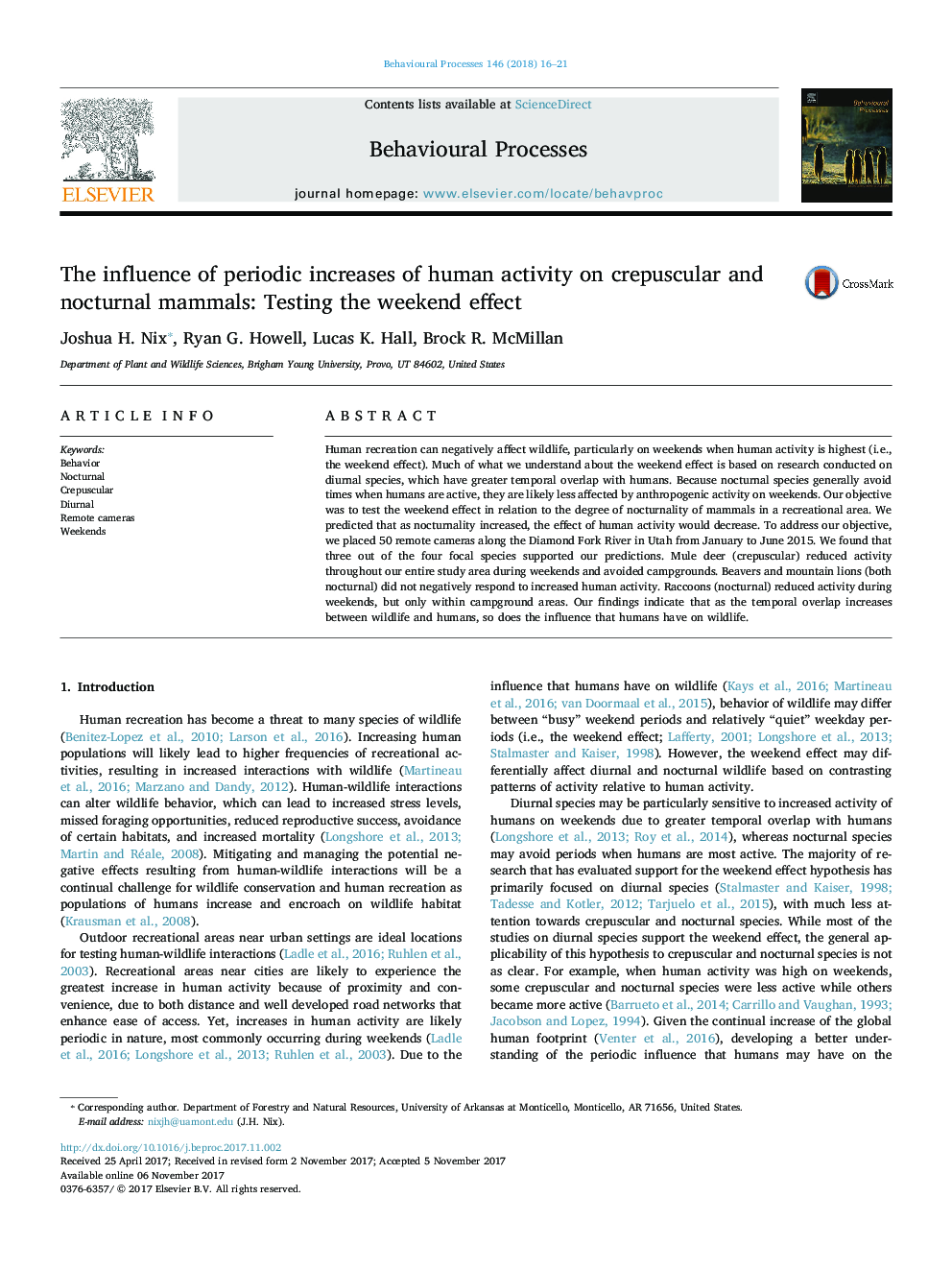| کد مقاله | کد نشریه | سال انتشار | مقاله انگلیسی | نسخه تمام متن |
|---|---|---|---|---|
| 8497026 | 1553135 | 2018 | 6 صفحه PDF | دانلود رایگان |
عنوان انگلیسی مقاله ISI
The influence of periodic increases of human activity on crepuscular and nocturnal mammals: Testing the weekend effect
ترجمه فارسی عنوان
تأثیر افزایش دوره ای فعالیت انسان در پستانداران غلیظ و شبانه: تست اثر آخر هفته
دانلود مقاله + سفارش ترجمه
دانلود مقاله ISI انگلیسی
رایگان برای ایرانیان
کلمات کلیدی
رفتار - اخلاق، شب بی نظیر، روزانه دوربین های از راه دور، آخر هفته ها
ترجمه چکیده
تفریح انسانی می تواند به حیات وحش منفی منفی، به خصوص در آخر هفته ها زمانی که فعالیت انسان بالاتر باشد (به عنوان مثال اثر آخر هفته). بخش عمده ای از آنچه که ما در مورد اثر آخر هفته درک می کنیم، بر اساس تحقیقات انجام شده بر روی گونه های روزانه است که همپوشانی زمان بیشتری با انسان دارند. از آنجایی که گونه های شبانه معمولا از زمانی که انسان فعال هستند جلوگیری می کند، احتمالا کمتر از آن تاثیر می گذارد که فعالیت های انسان شناسی در تعطیلات آخر هفته باشد. هدف ما آزمودن اثر آخر هفته در رابطه با میزان شب یابی پستانداران در یک منطقه تفریحی بود. ما پیش بینی کردیم که به علت افزایش غرور، تاثیر فعالیت انسان کاهش می یابد. برای رسیدن به هدف ما، 50 دوربین از راه دور را در امتداد رودخانه الماس چنگال در یوتا از ژانویه تا ژوئن 2015 قرار داده ایم. ما دریافتیم که سه نفر از چهار کانونی کانونی، پیش بینی های ما را پشتیبانی کردند. گوزن گوزن (خلال) در تمام مناطق مطالعه ما در طول تعطیلات آخر هفته کاهش یافته و از اردوگاه ها اجتناب می شود. شیرها و کوههای شیر (هر دو شبانه) به افزایش فعالیت انسانی واکنش نشان ندادند. راکون ها (شبانه) فعالیت خود را در طول تعطیلات آخر هفته کاهش داد، اما فقط در مناطق اردوگاه. یافته های ما نشان می دهد که با افزایش همپیمانی زمانی بین حیات وحش و انسان، تاثیری که انسان بر روی حیات وحش دارد.
موضوعات مرتبط
علوم زیستی و بیوفناوری
علوم کشاورزی و بیولوژیک
علوم دامی و جانورشناسی
چکیده انگلیسی
Human recreation can negatively affect wildlife, particularly on weekends when human activity is highest (i.e., the weekend effect). Much of what we understand about the weekend effect is based on research conducted on diurnal species, which have greater temporal overlap with humans. Because nocturnal species generally avoid times when humans are active, they are likely less affected by anthropogenic activity on weekends. Our objective was to test the weekend effect in relation to the degree of nocturnality of mammals in a recreational area. We predicted that as nocturnality increased, the effect of human activity would decrease. To address our objective, we placed 50 remote cameras along the Diamond Fork River in Utah from January to June 2015. We found that three out of the four focal species supported our predictions. Mule deer (crepuscular) reduced activity throughout our entire study area during weekends and avoided campgrounds. Beavers and mountain lions (both nocturnal) did not negatively respond to increased human activity. Raccoons (nocturnal) reduced activity during weekends, but only within campground areas. Our findings indicate that as the temporal overlap increases between wildlife and humans, so does the influence that humans have on wildlife.
ناشر
Database: Elsevier - ScienceDirect (ساینس دایرکت)
Journal: Behavioural Processes - Volume 146, January 2018, Pages 16-21
Journal: Behavioural Processes - Volume 146, January 2018, Pages 16-21
نویسندگان
Joshua H. Nix, Ryan G. Howell, Lucas K. Hall, Brock R. McMillan,
